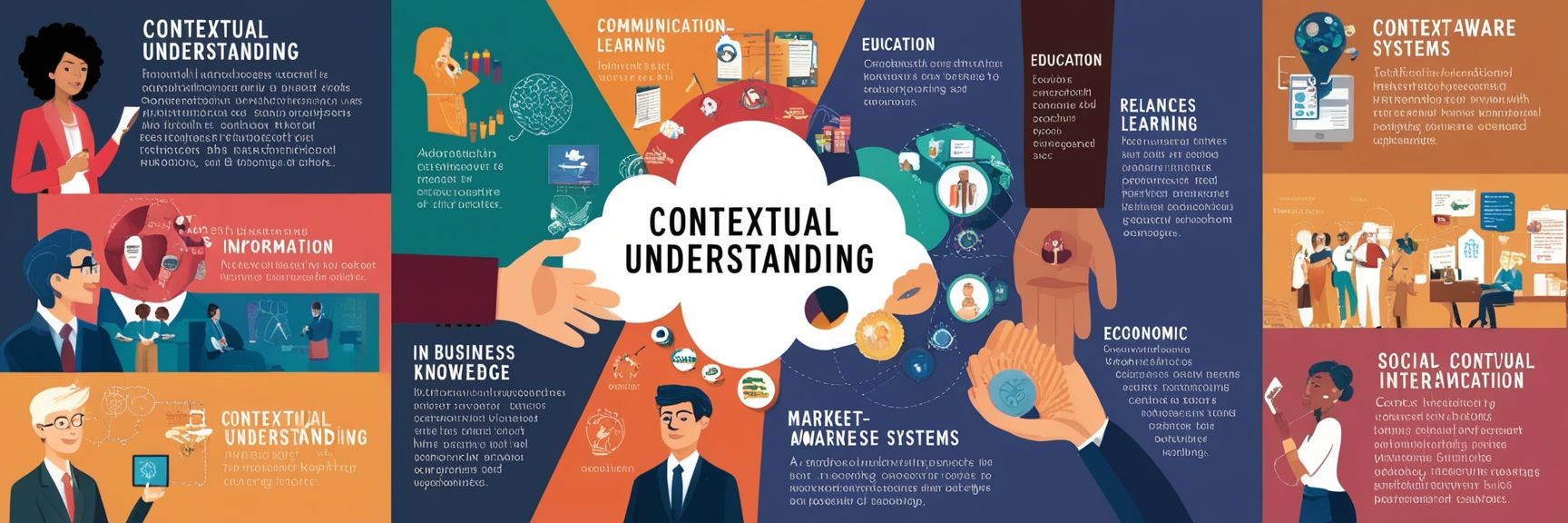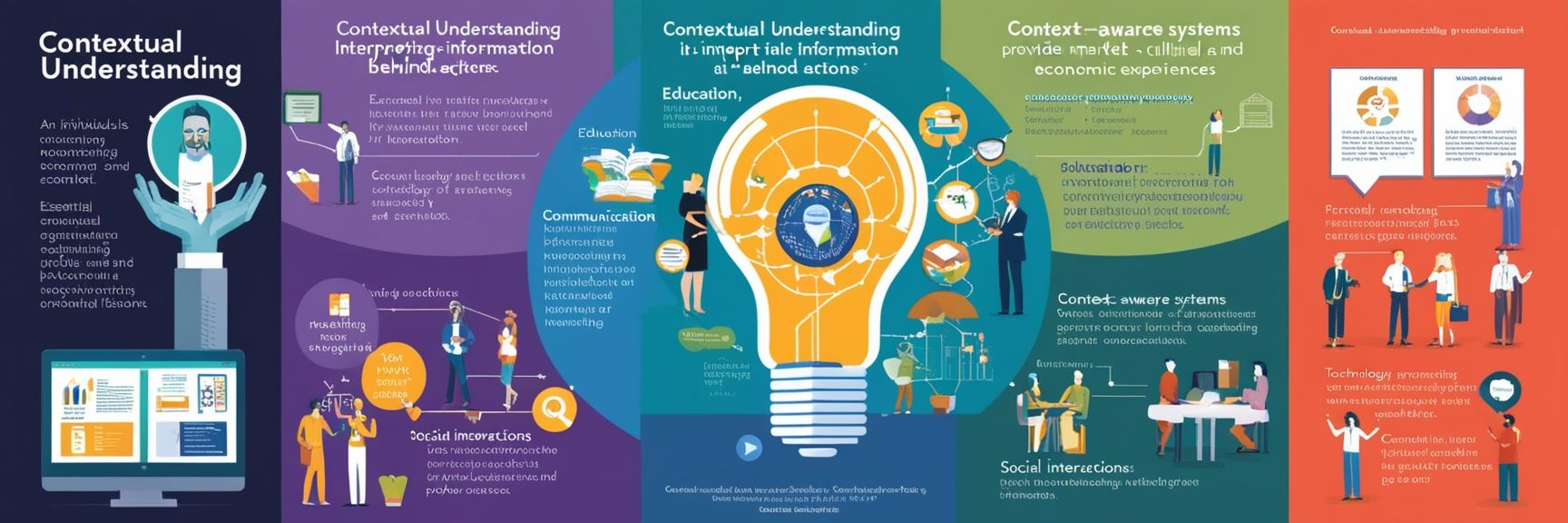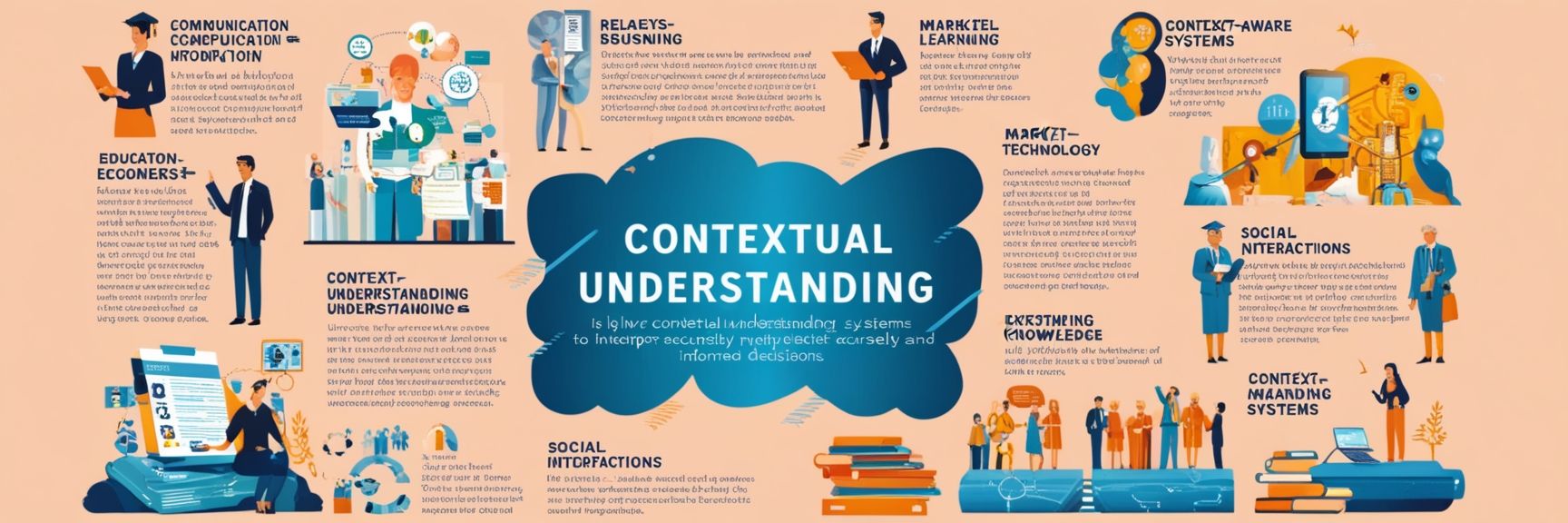The Importance of Contextual Understanding or Contextual understanding is crucial across various fields, from communication and education to business and technology. It refers to the ability to interpret information, behaviors, and situations within the framework of surrounding circumstances, backgrounds, and environments. Recognizing and appreciating the context in which something occurs can lead to more effective decision-making, improved relationships, and enhanced problem-solving capabilities. This article explores the multifaceted importance of contextual understanding.
Communication and Interpretation
Effective communication relies heavily on contextual understanding. Words and gestures can have different meanings depending on the situation, cultural background, and personal experiences. Without context, misunderstandings are likely to occur. For instance, the phrase “I’m fine” can mean different things based on the speaker’s tone, body language, and the situation in which it is said. Context helps decipher the true meaning behind words and actions.
In literature and media, contextual understanding allows readers and viewers to grasp the deeper meaning of content. Historical, cultural, and social contexts provide insight into characters’ motivations and the significance of events. Without this background knowledge, the interpretation of texts and media can be shallow or skewed.
Education and Learning
In education, contextual understanding enhances learning and retention. Students learn better when new information is presented within a framework they can relate to or build upon. This concept is rooted in constructivist learning theory, which posits that learners construct new knowledge based on their existing cognitive structures. For example, teaching mathematical concepts using real-life scenarios can make abstract ideas more tangible and easier to grasp.
Contextual learning also acknowledges the diverse backgrounds and experiences of students. Culturally responsive teaching, which integrates students’ cultural references into the curriculum, is a powerful tool in making education more inclusive and effective. It helps students see the relevance of their education in their own lives and fosters a deeper connection to the material.

Business and Marketing
In the business world, contextual understanding is vital for success. Companies must understand the market, cultural, and economic contexts in which they operate. This knowledge informs strategies, product development, and marketing efforts. For instance, a marketing campaign that resonates in one region may fall flat in another due to cultural differences. Understanding local customs, values, and consumer behavior is essential for creating effective marketing strategies.
Additionally, contextual awareness helps businesses adapt to changing environments. The ability to read and respond to economic trends, political climates, and technological advancements enables companies to stay competitive and relevant. For example, during the COVID-19 pandemic, businesses that understood the context of heightened health concerns and remote working conditions were able to pivot their operations and marketing strategies effectively.
Technology and Artificial Intelligence
Contextual understanding is increasingly important in the field of technology, particularly in the development of artificial intelligence (AI). AI systems that can interpret context are more likely to perform tasks accurately and efficiently. For example, natural language processing (NLP) algorithms that understand context can better interpret user queries, leading to more accurate search results and more meaningful interactions with virtual assistants.
Context-aware computing is another area where contextual understanding is crucial. Devices and applications that can adapt their behavior based on the user’s context, such as location, time of day, and activity, offer a more personalized and efficient user experience. For example, a context-aware smartphone app might adjust its notifications based on whether the user is at work, at home, or in transit.
Social Interactions and Relationships
Contextual understanding plays a significant role in social interactions and relationships. It allows individuals to navigate complex social dynamics, interpret social cues, and respond appropriately. Understanding the context of a conversation, including the relationship between the speakers and the social setting, helps individuals communicate more effectively and empathetically.
In conflict resolution, contextual understanding is key. Recognizing the underlying causes of a conflict, such as cultural differences, personal histories, or situational stressors, can lead to more effective and compassionate solutions. It allows for a more nuanced approach that addresses the root of the problem rather than just the symptoms.
Problem-Solving and Decision-Making
Effective problem-solving and decision-making require a deep understanding of the context in which a problem arises. Context provides the background information needed to identify the core issues, consider relevant factors, and anticipate potential consequences. Without context, solutions may be superficial, short-sighted, or inappropriate for the situation.
In strategic planning, contextual understanding helps organizations identify opportunities and threats in their environment. It allows them to leverage their strengths, mitigate their weaknesses, and align their strategies with external realities. For example, a company planning to enter a new market must understand the local economic conditions, regulatory environment, and cultural nuances to make informed decisions.
Healthcare and Medicine
In healthcare, contextual understanding is crucial for providing patient-centered care. Healthcare providers must consider patients’ cultural, social, and economic contexts to deliver effective and respectful care. For instance, understanding a patient’s cultural background can inform decisions about treatment plans, dietary recommendations, and communication styles.
Contextual understanding also enhances the patient-provider relationship. When healthcare providers take the time to understand patients’ personal circumstances, they can build trust and rapport, leading to better patient outcomes. This holistic approach recognizes that health is influenced by a wide range of factors, including lifestyle, environment, and social determinants.

Legal and Ethical Considerations
In the legal field, contextual understanding is essential for interpreting laws and regulations accurately. Legal professionals must consider the context of a case, including historical precedents, societal norms, and the specific circumstances of the parties involved. This contextual analysis ensures that legal decisions are fair, just, and relevant.
Ethical decision-making also relies on contextual understanding. Ethical dilemmas often involve complex situations where multiple factors must be weighed. Understanding the context allows individuals and organizations to consider the broader impact of their decisions and act in ways that align with their values and principles.
Global and Environmental Awareness
Contextual understanding is vital for addressing global challenges such as climate change, poverty, and social inequality. These issues are deeply interconnected and influenced by a multitude of factors, including economic systems, cultural practices, and political dynamics. A contextual approach recognizes the complexity of these challenges and promotes holistic, sustainable solutions.
For example, efforts to combat climate change must consider the economic and social contexts of different regions. Strategies that are effective in one country may not be applicable in another due to differences in resources, infrastructure, and cultural attitudes. A contextual understanding enables the development of tailored approaches that address the specific needs and circumstances of each community.
Conclusion
Contextual understanding is a powerful tool that enhances communication, learning, decision-making, and problem-solving across various fields. It enables individuals and organizations to interpret information accurately, navigate complex environments, and respond effectively to changing circumstances. By appreciating the context in which events and interactions occur, we can make more informed and compassionate choices, leading to better outcomes for individuals and society as a whole. As we continue to face increasingly complex and interconnected challenges, the importance of contextual understanding will only grow, highlighting its critical role in our personal and professional lives.

jgnj13
fpojnw
klx2y1
Hello. remarkable job. I did not anticipate this. This is a splendid story. Thanks!
n6i386
I am often to blogging and i really appreciate your content. The article has really peaks my interest. I am going to bookmark your site and keep checking for new information.
As I website possessor I think the content material here is real great, appreciate it for your efforts.
I am now not certain the place you’re getting your information, but great topic. I needs to spend some time finding out more or understanding more. Thank you for wonderful info I used to be on the lookout for this information for my mission.
It’s best to participate in a contest for probably the greatest blogs on the web. I’ll recommend this web site!
Keep up the superb piece of work, I read few content on this web site and I believe that your site is rattling interesting and holds bands of great info .
Just wanna comment that you have a very decent website , I love the pattern it actually stands out.
Woh I enjoy your blog posts, saved to bookmarks! .
There is visibly a bunch to identify about this. I assume you made some nice points in features also.
Throughout this awesome pattern of things you actually receive a B+ just for effort. Exactly where you actually confused us ended up being on the particulars. As people say, details make or break the argument.. And it could not be more correct at this point. Having said that, let me inform you what did give good results. The article (parts of it) can be pretty persuasive which is probably the reason why I am taking an effort in order to comment. I do not really make it a regular habit of doing that. 2nd, whilst I can easily see the leaps in logic you come up with, I am not really certain of how you appear to connect the ideas that make your final result. For the moment I will subscribe to your point but hope in the near future you connect your facts better.
I savor, lead to I found exactly what I used to be looking for. You have ended my four day lengthy hunt! God Bless you man. Have a great day. Bye
I will right away grab your rss feed as I can not find your email subscription link or newsletter service. Do you have any? Kindly let me know in order that I could subscribe. Thanks.
Have you ever considered about adding a little bit more than just your articles? I mean, what you say is valuable and all. However just imagine if you added some great pictures or videos to give your posts more, “pop”! Your content is excellent but with images and videos, this blog could definitely be one of the most beneficial in its niche. Good blog!
I was very pleased to find this web-site.I wanted to thanks for your time for this wonderful read!! I definitely enjoying every little bit of it and I have you bookmarked to check out new stuff you blog post.
Hello! Do you know if they make any plugins to assist with SEO? I’m trying to get my blog to rank for some targeted keywords but I’m not seeing very good gains. If you know of any please share. Cheers!
**finessa**
Finessa is a natural supplement made to support healthy digestion, improve metabolism, and help you achieve a flatter belly.